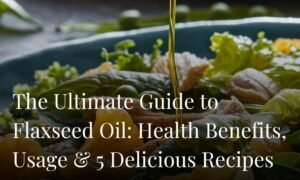

Cold Pressed Oils: Health Benefits, Uses & Why They’re Better Than Refined Oils
Cold pressed oils are becoming increasingly popular among health-conscious consumers seeking natural, nutrient-rich options to enhance their meals. Unlike refined oils, cold-pressed oils retain essential nutrients and flavour, making them a valuable addition to a balanced diet.
In this guide, we’ll explore what makes cold-pressed oils unique, their health benefits, and the best ways to use them in cooking.
What Does Cold Pressed Mean?
Cold-pressed oils differ significantly from refined oils because they retain more nutrients and natural compounds. The extraction process involves pressing seeds or nuts at low temperatures without using chemicals or excessive heat.
Why Does This Matter?
- Preserves vitamins, minerals & antioxidants
- Maintains natural flavours & aroma
- Keeps healthy fats intact, especially Omega-3s
In contrast, refined oils undergo high-heat processing, which strips away many beneficial nutrients, leaving behind only the fatty content. Additionally, cold-pressed oils are often produced using sustainable, eco-friendly methods, making them a better choice for both health and the environment.
What Are Cold Pressed Oils Used For?
Cold-pressed oils are versatile and packed with flavour, making them an excellent choice for a variety of culinary uses. Each oil has a distinct profile and works best in certain dishes:
- Flaxseed Oil – Best added to smoothies, salad dressings, or drizzled over soups after cooking to retain its Omega-3 benefits.
- Sunflower Oil – A great addition to salads, dips, or as a base for homemade mayonnaise.
- Almond Oil – Works well in desserts, drizzled over fruit, or added to baking recipes for a nutty, nutrient-rich boost.
- Poppy Seed Oil – Enhances pasta, vegetables, and baked goods, adding a unique flavour while contributing unsaturated fats.
Are Cold Pressed Oils Good for Cooking?
Cold-pressed oils are best enjoyed at low or moderate temperatures to preserve their delicate nutrients. They work well in dishes that don’t require high heat, such as salads, dips, or as a finishing touch after cooking.
Some oils, like flaxseed and sunflower oil, are highly sensitive to heat and should ideally be used raw. Almond oil can tolerate slightly higher temperatures, making it suitable for gentle baking, while poppy seed oil is best used as a finishing oil to maintain its nutritional value.
Are Cold Pressed Oils Healthy?
Cold-pressed oils contain a variety of essential nutrients, including antioxidants, healthy fats, and vitamins, making them an excellent addition to a well-balanced diet. Each oil offers unique health benefits:
- Flaxseed Oil – Rich in Omega-3 fatty acids, which help reduce inflammation, support heart health, and maintain healthy cholesterol levels.
- Sunflower Oil – Packed with antioxidants and Vitamin E, aiding immunity and skin health, and supporting digestive function.
- Almond Oil – A source of Vitamin E and Omega-3, helping to support healthy cholesterol, cognitive function, and immunity.
- Poppy Seed Oil – Known for unsaturated fats and linoleic acid, which promote hormone balance, support cardiovascular health, and contribute to skin care.
These oils provide essential fats that help reduce inflammation, support heart health, and contribute to overall wellness.
Nutritional Value of Cold Pressed Oils
Cold-pressed oils retain essential nutrients like Omega-3 fatty acids, vitamins (such as Vitamin E), and antioxidants due to minimal processing. These nutrients support various aspects of health, including:
- Heart health – Helping to lower cholesterol and reduce inflammation.
- Immune support – Strengthening the body’s defences against illness.
- Skin & hair health – Promoting hydration, elasticity, and overall skin radiance.
Cold Pressed Oils vs. Refined Oils
Cold-pressed oils differ significantly from refined oils, which undergo high-heat processing and chemical treatments that strip away many natural nutrients. Here’s how they compare:
- Cold-pressed oils retain their natural flavour, nutrients, and purity.
- Refined oils lose many of their beneficial properties due to processing.
- Cold-pressed oils are often sustainably produced, making them a better environmental choice.
- Refined oils have a longer shelf life but lack the nutritional value of cold-pressed alternatives.
Cold-pressed oils are best used in low-heat or raw applications, while refined oils are often chosen for high-heat cooking.
How Long Do Cold Pressed Oils Last?
Due to their natural extraction process, cold-pressed oils often have a shorter shelf life than refined oils. Without preservatives or chemical processing, they remain in their most natural state, but this also means they require careful storage.
To maintain freshness and nutritional value, store cold-pressed oils in a cool, dark place or refrigerate them after opening. Signs of spoilage include a rancid smell or cloudy appearance. Always check the bottle for an expiration date and use the oils within the recommended period after opening.
Final Thoughts
Cold-pressed oils offer a pure, nutrient-rich way to add flavour and health benefits to your meals. From flaxseed to poppy seed, each oil has a unique nutritional profile that supports different aspects of health, whether it’s heart function, skin care, or immune strength.
By choosing cold-pressed oils, you’re opting for a natural, flavourful way to enjoy the many health benefits that these nutrient-packed oils bring to your plate.








